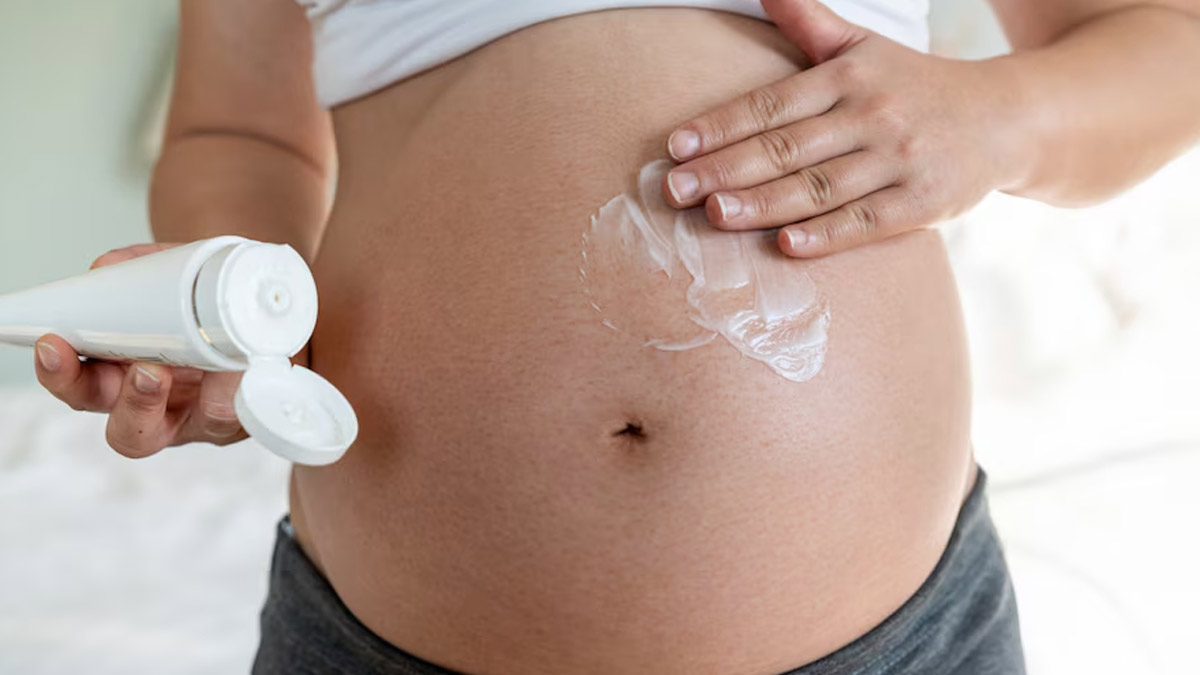
Pregnancy is a transformative time, bringing about numerous physical changes as the body adapts to support a growing baby. However, did you know many women deal with dry skin during pregnancy? This can lead to flaky skin, itchiness, and other symptoms, which can be uncomfortable and concerning. Understanding the causes of dry skin during pregnancy and effective treatments can help expectant mothers manage this common issue. We spoke to our expert Dr Atula Gupta, Dermatologist, Dermatosurgeon, Paediatric Dermatologist MBBS, MD-Dermatology, Venerology and Leprosy, who shared insights on the same.
Table of Content:-
Reasons for Dry Skin During Pregnancy

Dry skin in pregnancy may manifest with itching, scaly patches, rough texture, redness and cracks in severe cases. According to the Journal of Clinical and Aesthetic Dermatology (JCAD), The majority of pregnant women experience skin changes, which can manifest as physiological or hormonal shifts, exacerbation of existing skin conditions, or the emergence of new dermatoses. These alterations are linked to changes in hormones, vascular conditions, metabolism, and immune function during pregnancy.
Dr Gupta listed the reasons for dry skin during pregnancy as follows:
- Hormonal Changes: Pregnancy hormones, particularly progesterone and oestrogen, fluctuate significantly. These hormonal shifts can affect skin hydration and lead to dryness.
- Increased Blood Volume: The body’s blood volume increases to support the developing foetus, which can divert moisture from the skin, resulting in dryness.
- Stretching Skin: As the abdomen and other parts of the body expand, the skin stretches, which can disrupt its natural moisture barrier and cause dryness and itching.
- Dehydration: Pregnant women are more susceptible to dehydration because their bodies require more fluids. Inadequate water intake can directly contribute to dry skin.
- Environmental Factors: Seasonal changes, low humidity, and exposure to harsh weather can exacerbate skin dryness. Pregnant women might also find their skin more sensitive to these factors.
Also Read: Migraine Attack During Pregnancy And Caffeine Consumption: Expert Explains The Connection
Managing Dry Skin During Pregnancy
Dr Gupta listed that expectant mothers can follow to alleviate discomfort and maintain healthy skin during pregnancy as follows:

Hydration
Drinking plenty of water is crucial during pregnancy. This is because adequate hydration helps maintain skin elasticity and moisture levels. Make sure you drink at least 8-10 glasses of water every day, depending on your activity level and personal needs.
Moisturising
Using a good-quality moisturiser can help retain skin moisture. Look for products containing ingredients like hyaluronic acid, glycerine, and ceramides. Natural options like coconut oil, shea butter, and aloe vera are also effective.
Gentle Cleansing
Choose mild, fragrance-free cleansers to prevent stripping the skin of its natural oils. Harsh soaps and long, hot showers can worsen dryness.
Humidifiers
Using a humidifier in the home, especially during winter or in dry climates, can add moisture to the air and help keep skin hydrated.
Also Read: Pregnancy Care: Expert Explains The Importance Of Maternal Diet And Nutrition And How To Focus
Balanced Diet
A diet rich in essential fatty acids, vitamins, and minerals supports skin health. Foods high in omega-3 fatty acids (fish and flaxseeds), vitamin E (nuts and seeds), and antioxidants (fruits and vegetables) can be beneficial.
Sun Protection
Did you know pregnant skin can be more sensitive to the sun? Hence, use a broad-spectrum sunscreen with at least SPF 30 to prevent further dryness and protect against UV damage.
Avoid Irritants
Steer clear of skin care products containing alcohol, retinoids, or other harsh chemicals that can exacerbate dryness. Wearing loose, breathable clothing made of natural fibres like cotton can also reduce irritation.
Consultation with a dermatologist
If dry skin persists or becomes severe, it’s essential to consult a dermatologist. They can rule out underlying conditions, such as eczema or psoriasis, which might require specialised treatment.
[Disclaimer: This article contains information provided by an expert and is for informational purposes only. Hence, we advise you to consult your expert if you notice any skin issues to get the necessary treatment.]
Also watch this video
How we keep this article up to date:
We work with experts and keep a close eye on the latest in health and wellness. Whenever there is a new research or helpful information, we update our articles with accurate and useful advice.
Current Version